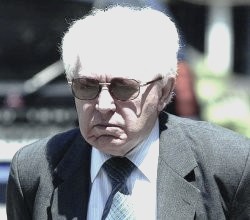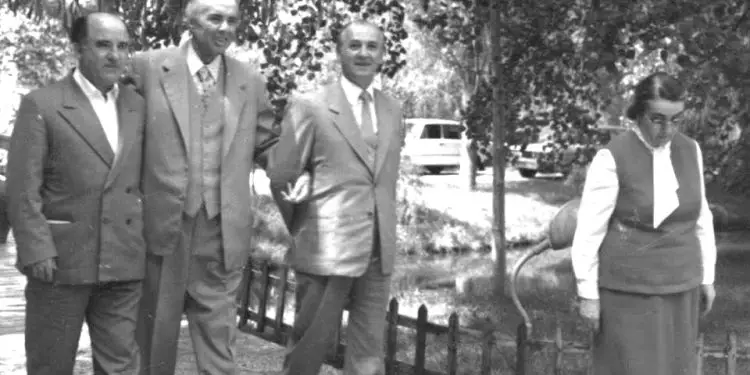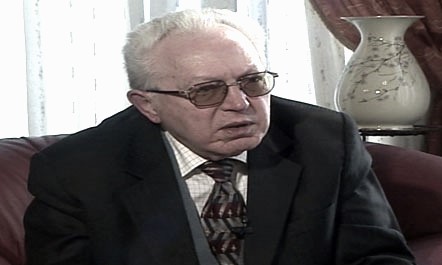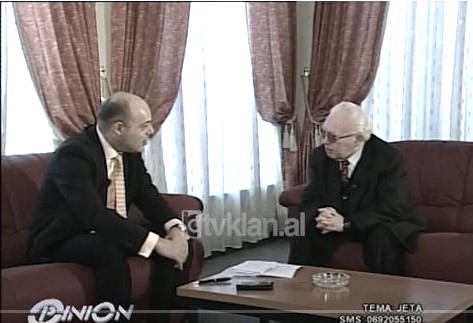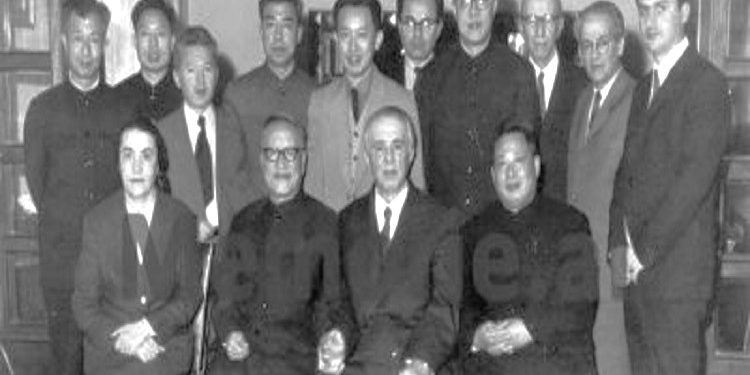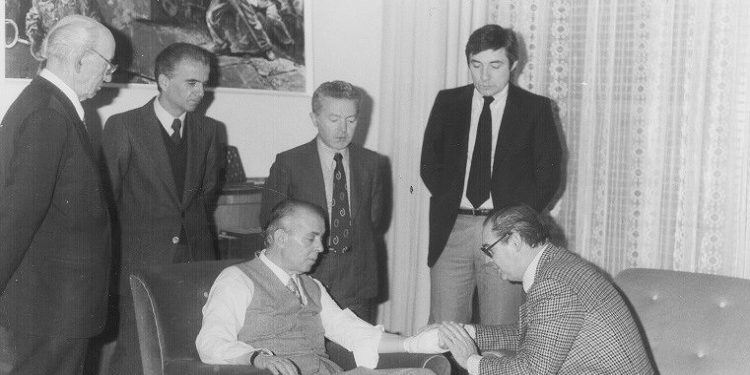By Blendi Fevziu
Part Three
Memorie.al / The renowned physician and academician, Prof. Dr. Ylli Popa, originating from a well-known family with intellectual traditions from the city of Elbasan, graduated in Medicine in Bucharest and Moscow in the late 1950s, a lecturer at the Faculty of Medicine in Tirana and founder of the Albanian School of Cardiology, former Chairman of the Academy of Sciences of the Republic of Albania from 1997 to 2007, former Member of the People’s Assembly before the 1990s, decorated with various medals and orders, as well as the high title “Hero of Socialist Labor,” in 2007, gave a long account of his life and career as a physician and academician to journalist Blendi Fevziu on the show “Opinion” on Tv Klan. In his account, Prof. Popa dwelt extensively on how he became Enver Hoxha’s doctor, how the dictator was treated, the meeting with Nexhmije and Ramiz on the last night Enver Hoxha died, and how the news was announced, etc. More about this, etc., is revealed in his interview, which we are publishing in several issues.
Continued from the previous issue
Ylli Popa: Then Nexhmije tells us that Enver is asking for me upstairs – Enver was in bed, upstairs. And she told us to continue, as she would be back soon. Bajram continued his explanation, this coincided with the medicine that the professor in Vienna gave us, and he took out the medicine and handed it to Ramiz. Nexhmije wasn’t there, she was upstairs. Ramiz took the medicine, looked at it.
It was unlabeled, unnamed, a stopper that could be opened, and he tells Bajram, after glancing towards the door: “Put the medicine in the bag.” Bajram was surprised, as he was a very honest man, and he tells Ramiz that; “he was a great professor, and he has tested this medicine and it has good properties.” Ramiz looked at the door again and told him once more: “Bajram, put that medicine in the bag.” He didn’t want Nexhmije to see it.
For what reason?
I’ll tell you why…! Then the third time as well, he said: “Oh Bajram, put the medicine away and I’ll explain how things are.” Bajram took the medicine and put it in the bag. Then Nexhmije came and didn’t see this scene. “Oh Bajram,” I said when we went outside, “because he started explaining outside again, telling me that; you saw yourself that he was competent in his work, and so on.
“Oh Bajram,” I told him, “it’s not about the medicine, but if this medicine were given to comrade Enver now, he is at the end of his life and a medicine cannot do anything for him.” I told him that because then the “music” would start, about “what you gave him, what medicines you gave him,” because his end would then be linked to the medicine.
And you would be accused of poisoning him…?!
Ramiz understood this point. I asked Ramiz later; if he would save us?! “Yes, yes,” he told me.
When did Enver Hoxha’s condition worsen? When did you learn the news that he was dying?
The signs of Parkinson’s became very pronounced. He had periods where he couldn’t even lift his hand above his head, but mentally he was fine.
When did he actually die?
Enver died, it seems to me, in the evening. In fact, it happened that he was on infusions, which were necessary at the time to maintain his blood pressure, etc., etc. The nurses were working, and the other doctors were also scattered. I and Petrit Gaçja were in the room when Enver died. We confirmed this and knew that in the neighboring room, Ramiz Alia was with a member of the Political Bureau at the time.
Even then they told us that; you should tell comrade Ramiz. We went there, and they were waiting behind the door and asked us: “Well, how is he…?”! Petrit told him that; “Comrade Enver, is finished.” Then this Bureau member tells Ramiz: “Long lives the Party.” This was a formula at the time. With an interval of a few seconds, he tells him: “Long live you, comrade Ramiz.”
Who was this Bureau member?
Hekuran Isai.
So, the moment Enver Hoxha died, the new leader had arrived…?!
I thought so too. That of Louis XIV; “The King is dead, long living the King.”
After so much time, are you sure, Professor, that there was no intervention for Enver Hoxha’s premature death?
No, no, none at all. The autopsy confirmed this. Thankfully the autopsy was done, because Mehmet Shehu’s autopsy was not done, there’s endless speculation now.
You were his physician and stayed Enver’s doctor for 12 years. Do you now separate the medical treatment of a patient from his political action? Are you critical of his political action, as one of Albania’s most dictatorial figures?
Yes. In fact, I recommend this to those who pronounce differently and write differently. Medical action must be separated from political action.
Did you have political reservations about Enver Hoxha at that time?
Yes, I had reservations. And there were, because if you thought about it, I personally did not agree with the savagery of the class struggle, I did not agree with the economic policy, with the isolation of the country. There were also many things that were done well, starting with electric light and water.
Did you dare to mention any of these reservations to Enver Hoxha?
No, I didn’t open up, it wasn’t even discussed.
Ylli Popa: How I knew Berisha and how he changed!
The renowned academician, Prof. Dr. Ylli Popa, in this interview, also confessed to knowing the former Prime Minister and President of Albania, Prof. Dr. Sali Berisha, their discussions about the communist system, and Ramiz Alia’s actions in 1990. How Prof. Popa wrote the article “In Search of Lost Time” in the newspaper “Zëri i Popullit.” Etc.
Professor Ylli, you were a member of the People’s Assembly before the 1990s, how did that happen?
I was a person who worked hard. The requirements needed for that job, I met. But it is likely that Enver also influenced it; it may have been an order.
In which year were you elected a Member of Parliament?
There were two legislatures, 1982-1986 and 1987-1991.
In which year did you meet the former Prime Minister and President of Albania, Sali Berisha?
Since he was a student. Since the 1970s.
What were your relations with him?
Very, very good relations.
In what sense?
Well, because I liked Sali at that time. He was a very energetic boy, very hardworking, he read a lot. I gave him many books, which were forbidden books of the time, that is. For example, I gave him; “Cancer Ward” by Solzhenitsyn, and many other books that he devoured, he read with pleasure. That’s why I liked Sali, because he was multilateral in this regard.
What was his quality as a doctor?
It was good. He was interested in both the sick and scientific research.
Was Sali Berisha ever in Enver Hoxha’s medical group?
No, he was not.
In no case?
No. In no case.
Did he express political interest at that time?
I used to talk to Sali. We were critical of many things. But I emphasize that our political position, or our opinion, our judgment, must be separated from the opinion of the patient and whatever he represents in himself. For us, a sick person is a sick person, whoever they may be.
What was your opinion about the regime? Were there criticisms? Did you talk to each other? Did you criticize the regime in informal conversations with each other?
We talked with nuances. Then it didn’t happen that we talked with many people. You will talk to one person, and you can talk openly with them, while with another, you may talk a bit more reservedly. But, I talked openly with Sali.
Around what years was this, right from the beginning?
Right from the beginning, almost from the beginning.
What were your later relations like?
Not like before. Of course, he got involved in politics, I continued on my path, he had his preoccupations and there was no more time for us to meet and talk. But even when he became President, I was at the Helsinki Committee, I would go to his office, and have a coffee there, with Kujtim Çashku, with other friends of the Helsinki Committee. After 1994, there was a change. I say that the Sali of those years is no longer the one from that time.
In what sense?
Of these contacts of ours, of these conversations of ours. Furthermore, I say that Sali has changed a lot. In the sense that when Sali thinks that a reform must be made in the Academy of Sciences, we agree, you are the Prime Minister and you are allowed to do this. But, I have been leading the Academy of Sciences for 10 years and I started the reform in the Academy of Sciences, together with my colleagues in the Presidency, from the first week we were appointed here.
Because they wanted to appoint us, but we said; no, we will change the regulation of this academy and democratize it. We will hold secret elections and we applied these changes. Sali did not even ask, to tell me, that is: “Oh Ylli, I will make a reform, what do you think?” I requested a meeting three times in writing from the Academy of Sciences, with my signature, but I never received anything.
It seems that some criticisms were conveyed to Sali regarding his state work. But I did not change this; this is how I was even during Enver’s time, with Sali. I talked to Sali about things that were against the regime. Since Enver’s time. Why, would I change now, would I be afraid of Sali?!
Were the criticisms public, or not?
With friends here, with people. Not in the press. I have talked about some things, some things. There are informants with us, as much as you want. I didn’t want to make these relationships public, because of the relations I had with Sali.
But, to act in this manner, the biggest scandal has now happened in the Academy of Sciences. Now this institution, with the second law that came out after this year, because a law came out that reformed, that the institutes were taken away, it was called that the institutes are of the Soviet Academy, the Bolshevik type, that’s how he expressed it.
When I heard Neritan Ceka speak in Parliament one night, in defense of the Academy, and I heard Sali say that it is a Soviet-type Academy, etc., etc.! I said: “Oh my goodness, Sali is accusing me of wanting to keep a Soviet-type Academy”?!
Is this a personal matter, Professor, related to concepts?
I don’t know.
Professor, one of the things that has remained an important part of the history of transformations in Albania is the article you published in the newspaper “Zëri i Popullit,” in two issues. It is about an article published in April 1990. How did you get the idea for this writing?
You reminded me of something else that I want to mention here, because I cannot mention it anywhere else. Two years before this article, that is; “In Search of Lost Time,” which caused a stir at the time, I wrote another article, in March 1988. Even that writing presented a lot of interest at the time, surprisingly for me. How did it happen…?
The director of the hospital tells us – it was customary then in the hospital that once a week, the heads of the clinics would gather and discuss various issues, because the time was approaching for the annual hospital report. I stood up and said that; “I do not agree with this annual report, we have made reports for each separate clinic, and I am not interested in what problem the dermatologist or the ophthalmologist has. For me, it is a waste of time,” I told him, “therefore I will not participate in this.”
“No, it must be done,” he told me, and I told him that; it will not be done, I insisted. One night he calls me on the phone, two or three days later. “Look,” he tells me, “comrade Manush Myftiu will come, he will come to our meeting, please, you are the largest clinic in our hospital, and you have results,” the director tells me, “participate in this.” I sat up all night and wrote, I didn’t sleep at all. I wrote an article, and it appeared in the newspaper.
But, before it appeared in the newspaper, we went there, to a large hall, the whole hospital, doctors and nurses. The first secretary of the region had arrived. He is the brother of our ambassador whom we had in Greece, the last time. We sat there at a long table, and I read my writing, and it was a great success. That article was structured in two parts, one was, not just about cardiology, but also about other health issues, while in the second part, I mainly focused on the ability and inability of the staff.
I mainly had it for the clinics or for the doctors, the heads at that time who took weak staff, because you commanded the weak one more easily, while with the more capable and competent one, there would be more problems. I didn’t care at all about their problems; I always took good staff. However, by treating it in this way, I also went slightly beyond the hospital limits, I also covered it as a party, as a state, how the staff in general were appointed.
When I returned to my seat, Hajro Zeneli, who was the first secretary of the region, said: “Professor, this was good, but you must have made many enemies with this paper.” “Enemies from whom,” I asked him. “From the incompetent ones,” he told me, “because you hit them the hardest.” “It doesn’t bother me,” I told him, “because the incompetent one doesn’t understand and is incompetent.” In fact, even when we went outside, the people who were the first to shake my hand, for the good speech, were the incompetent ones. They took this article. It was Musa Ulqini, who was a journalist at “Zëri i Popullit.”
He was a young boy and often came to the hospital to ask for articles, as he covered healthcare. I myself didn’t write and would send him to my colleagues. Then, not only that, but after two days, they told me that; allow us to translate this article into English and French, to give it to the magazine “Albania Nouvelle,” which was for the outside world. Then they called me to an office in the Central Committee of the PPSh (Party of Labor of Albania) and congratulated me for this. I was surprised myself at what this reaction was. Anyway, it seemed that the party at that time wanted support, which also had somewhat critical, different voices in our environment.
As for the writing “In Search of Lost Time,” I was stimulated by a Plenum of the Central Committee of the PPSh, which took place at that time, in 1990 perhaps, in the first months. I don’t know the order, but Ramiz Alia at that time gave some more liberal, more relaxed theses. Then I said that I would write something too, and I started writing. Coincidentally, I met Teodor Keko, near my house, he was working at the newspaper “Drita” at the time, and he asked me for an article. Memorie.al




